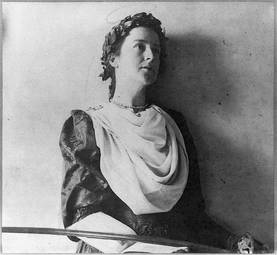 Louise Imogen Guiney, circa 1893 (US Library of Congress). O'Reilly remained an opponent of women's suffrage throughout his life, although he argued for the protection of women's rights in the workplace. He hired women such as Guiney and Katherine Conway as journalists for The Pilot. Guiney dedicated her first book of poetry to O'Reilly. Louise Imogen Guiney, circa 1893 (US Library of Congress). O'Reilly remained an opponent of women's suffrage throughout his life, although he argued for the protection of women's rights in the workplace. He hired women such as Guiney and Katherine Conway as journalists for The Pilot. Guiney dedicated her first book of poetry to O'Reilly. Despite all O’Reilly’s writings in support of civil rights and in opposition to prejudice he would play a different role in the long-running campaign to obtain voting rights for women. Throughout his time with The Pilot O’Reilly was a consistent opponent of women’s suffrage. His attitudes to women's struggle to gain the vote are analysed in detail in my biography of O'Reilly. They were an amalgam of many influences, partly religious, and partly based on O'Reilly's view that society and civilisation was ultimately underpinned by violence. Society, he argued, was a fragile blend of competing interests, each of which were backed by men willing and able to fight for what they believed. It was those competing interests which were the driving force of history and if the disparate groups that formed the social order failed to compromise then violence was the inevitable result. According to O’Reilly, the delicate balance of society would be skewed by women’s suffrage. His reasoning was that women are physically the weaker sex so it was worse than futile to give women the vote. They would never be able to protect their interests through force and would be trampled upon by men. The ensuing disregard for law would set a brutal and dangerous precedent that would spread anarchy throughout the land. ‘A vote, like a law’, he once declared, ‘is no good unless there is an arm behind it; it cannot be enforced. This is a shameful truth, perhaps, but it is true.’ This belief caused O'Reilly to move away from principles that were otherwise central to his world view. Although he would not have seen it this way, O’Reilly was a man who toiled on behalf of so many of the disenfranchised groups of the United States but who was willing to deprive women of the chance to live a full life. In his defence of the Irish, blacks, Jews, and others O’Reilly was continually vigilant for those commentators and politicians who sought to limit the freedom of achievement of particular groups. This vigilance was absent when it came to suffrage for women and O’Reilly repeatedly resorted to listing virtues and characteristics that he believed were inherent to women and which made them perfectly suited to their historical mission as ‘queen of the household’. For O’Reilly they often seemed to be wholly defined by these supposed characteristics: "We want no contest with women; they are higher, truer, nobler, smaller, meaner, more faithful, more frail, gentler, more envious, less philosophic, more merciful - oh, far more merciful and kind and lovable and good than men are. Those of them that are Catholics, are better Catholics than their husbands and sons; those who are Protestants are better Christians than theirs. Women have all the necessary qualities to make good men; but they must give their time and attention to it while the men are boys." O’Reilly’s attitude would persist in the pages of The Pilot long into the future. James Jeffrey Roche, who joined the paper in 1883 and who later followed O’Reilly as editor of the paper, revered his friend and former boss. Roche followed his idol’s line on many issues, including that of women’s suffrage. The above passage from O’Reilly, he considered to be ‘one of the best ever’ responses to the supporters of women’s suffrage. O’Reilly, Roche, and others like them would remain unmoved by the arguments of women who sought to climb down from their pedestal and who refused to let such lists be the limits of their lives. Comments are closed.
|
Ian Kenneally
Short articles about the life and times of John Boyle O'Reilly. Archives
March 2020
Categories
All
|